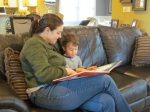 Although Katie and I usually write for teachers, this post will be for parents of preschoolers and kindergarteners. As I speak to this group of parents I notice their constant worries – “Is my kinder teacher good enough? I don’t want my child falling behind.” Or “Is there more I should be doing at home?” “How much is my child supposed to know before beginning school?” In my October 24th blogpost I began to give some advice to parents, but I’ll go a little further here and reference some past posts that share some great practices in a kinder classroom.
Although Katie and I usually write for teachers, this post will be for parents of preschoolers and kindergarteners. As I speak to this group of parents I notice their constant worries – “Is my kinder teacher good enough? I don’t want my child falling behind.” Or “Is there more I should be doing at home?” “How much is my child supposed to know before beginning school?” In my October 24th blogpost I began to give some advice to parents, but I’ll go a little further here and reference some past posts that share some great practices in a kinder classroom.
- Before all else, ask yourself, “Is my child happy in school?” And “Does your child feel safe?” I don’t mean just physically safe, but safe enough to ask questions, safe enough to take risks, and safe enough to make mistakes without being made fun of. Is your child allowed to play in the preK or K class? Read one of the many ways that Katie encourages her kinders to play here.
- Does the teacher read aloud books to the children daily? For me, this is the single most important job of a PreK and K teacher. Does your child also get some individual time to look through some books on her own or with a partner during the school day? At home, you can be reading picture books (2-3 every night before bed). Ask your public librarian for suggestions based on your child’s age and interests. Read Pat’s blog about wordless books. Also see Katie’s blog “We are Readers!” to see how she treats all her kinders as readers no matter where they are on the beginning- to-read continuum.
- When you get the opportunity as a parent to meet with the teacher, ask how your child is progressing. Don’t be concerned about how he compares to the other students in the class (eg. “Is he in the top group?”) You really want to know if the teacher is taking your child from where he entered and supporting him in moving forward as a reader, writer, speaker, and learner. “Take Them from Where They Are” is a blog Katie wrote for other K teachers.
- What’s coming home in that folder or backpack? Don’t look for worksheets or pages with grades on them. Instead, look for a weekly newsletter or some communication from the teacher as to topics studied or discussed that week. Is there a way for you to find out what books were read in K this week; perhaps there was a favorite you can get from the library to reread. Find out one thing Katie’s kinders bring home every weekend in A Home Connection for Shared Reading.
- Young children are naturally curious. How does your child’s teacher support this? Read how one kinder teacher keeps the wonder alive in her room – The Wonder of it All.
- Is there a daily time for writing in the classroom? (Granted, many preschoolers and some kinders may just be drawing or even scribbling and that is age appropriate.). In Katie’s kindergarten, and in many others across the U. S., the kids write from the very first day. See Writing in Kindergarten. (Other posts on writing were 9/22/12 and 9/15/12.) Unfortunately not every K classroom will have an on-going writing workshop, so as a parent, you can read up on the topic in the book Already Ready, by Katie Wood Ray.
- There are so many wonderful sites on computers for your child, I couldn’t even begin to suggest some in this post. The number one rule, though, is to limit screen time. And the best advice for selecting a site would be, “if it looks like a workbook page, then it is a workbook page.” Stay away from those skill-and-drill type sites.
Nice one Aunt Pat!
Could you please direct me to the research basis for limiting screen time? I intutively know this, but when I asked a school district-level techonology coordinator their recommendations for kindergarteners and 1st graders when using computers or tablets, they looked at me like I was crazy for even thinking there should limitations! This was in a district where they were rolling out their 1-1 tablet program.
Ashley – I have no research for limiting screen time, just plain ole common sense. Why would you want kids constantly on computers and not playing with other kids, being outdoors in fresh air, doing imaginative play, creating, building, drawing, inquiring, investigating, singing, reading, listening to stories, acting out stories, and so on? I think tablets in school are great, and I’m sure most teachers would use them appropriately.